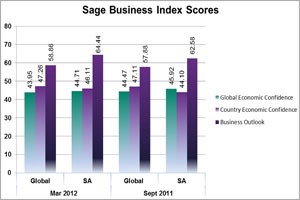
Of the 15 countries measured across the world, South Africa ranks as the second-highest country for business confidence among small- and medium-sized companies.
According to Ivan Epstein, CEO (and co-founder) of Softline and Sage AAMEA (Asia, Australia, Middle East and Africa), a look at the results against an international backdrop depicts South Africa scored the second highest index rating of all the countries polled in terms of individual business confidence.
“Entrepreneurial spirit and business culture is identified by businesses as one of the most important aspects for doing business successfully in South Africa. This endorses my strong belief that South Africa is a fertile environment for successful entrepreneurs and small businesses”, Epstein added.
The survey – The Sage Business Index – Local and International Business Insights – which was published on Thursday is a global measure of confidence of about 11,000 small and medium sized businesses in 15 countries across Europe, North America, Brazil, South Africa and Asia.
Compiled by Softline, the report showed that South Africa’s business confidence score for September slipped slightly to 64.19 from 64.44 in March, but was still higher than 62.58 in September.
While the business index signify local confidence in business prospects, confidence in South Africa economy dips. The report says confidence in the BRICS nation economic prospect dropped to 43.03 from 46.11. Confidence in the global economy also fell to 44.54 in September 2012 from 44.71 in March 2012.
However, increasing costs are the major concern of businesses surveyed in South Africa. On this, Rob Wilkie, Softline CFO and Sage AAMEA said “this was expected given that CPI is on an upward trend with the main drivers being food prices, fuel and electricity. In addition, an inevitable consequence of the recent high wage increases seen in the mining and transport sectors is going to be higher inflation, particularly when decoupled from increased productivity”.
There are also some positive signs in the global survey as 63 percent of respondents says that over the past 6 months revenue has either increased or held steady whilst 82 percent have either increased or maintained employee numbers.
Wilkie stated that “72 percent of South African businesses said that they have adapted to the challenges of the current economic climate. The agility and resilience of businesses in South Africa is testament to a strong entrepreneurial business culture and strength of South Africa as a place to do business”.
All countries surveyed except Singapore (54 percent of respondents indicated that their Government provides adequate support) complained that their governments don’t provide sufficient support for business. South Africa businesses are calling for skills development and education (46 percent), the reduction of bureaucracy and legislation (40 percent), a reduction in business tax (34 percent) and currency stability (28 percent).
Wilkie commented that, “in order to enhance its competitiveness, government must address the quality of primary education, particularly in view of a very high unemployment rate. Over-regulation and red tape is a further obstacle, specifically firing and hiring practices, wage determination, public sector tender procedures and enforcement of contracts”.
In the future, 29 percent of South African businesses surveyed said they were looking to diversify into new markets, 28 percent would invest further in marketing and sales within their existing markets and 27 percent would invest in skills development and training.
According to Epstein, “economic and political reforms in Africa have resulted in an improved business environment and offer an attractive opportunity for South African businesses to diversify and expand across their border.”
“ We’ve seen evidence in this research report and others, that small and medium sized business in South Africa require more focused attention from our leaders. The future of the South African economy, and most importantly, the ability to create employment in this country will be dependent the stimulation of more businesses that are sustainable over the long term. Private business and Government have a pivotal role to play in the economic growth and development of small business in South Africa,” Epstein concluded.
The research for the poll was carried out by Populus, a UK-based opinion and research company on 1879 South African small to medium size businesses.
Source :ventures-africa.com